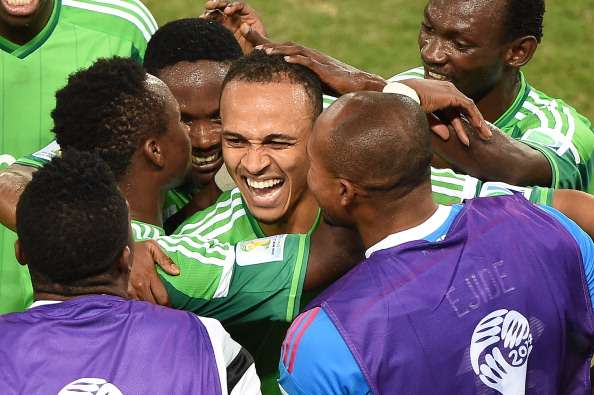Keshi has overseen a glorious era since he was announced as head coach.
The Super Eagles now play as a team. Discipline and dedication are at the core of Keshi’s approach to the game. Gone are the days when the likes of Jay-Jay Okocha, Nwankwo Kanu and Obafemi Martins did not take call-ups seriously but turned up late to training camps whenever they pleased. Some didn’t even honour the call-ups.
Such behaviour led to dismal performances from players who played exceptionally for their clubs but failed to replicate it in the national team. Keshi demands respect and that’s why it took a while before Peter Odemwingie could be brought back into the fold after making unpleasant remarks about the Big Boss.
Keshi should be given the biggest credit for mixing local and international based players. Some might argue that it’s not right because of the inexperience on the side of the local players and such inexperience had shown at the World Cup. If that’s the case, Egypt won the AFCON thrice consecutively with a team virtually made up of home-based players. Cote d’Ivoire have a team dominated by foreign-based players yet they have failed to win the AFCON since 1992 and have not progressed out of the World Cup group stage on three attempts.

Ghana have a youthful team mixed with experience. A team that was made of virtually under-23 players reached the 2010 AFCON final before losing at the death to Egypt. The team have made it out of the World Cup group stages twice in three attempts, making it to the quarter finals in 2010.
Some argue that Nigeria’s performance at the World Cup was not fascinating that more was expected even though the Super Eagles qualified from the group stage. If that’s the case, Argentina was one of the least-spectacular teams among the giants yet they made it to the final. If credit can be given to Argentina for making the final, the same should apply to Nigeria, for their relative standard.
There is nothing fundamentally wrong with Keshi’s selections. The Nigeria Premier League has not grown to be a top league in Africa but has lots of talents that are ready to show the world what they can do. Such players are ready to give their all compared to a player like John Obi Mikel, who has played across the globe but looked a shadow of his former self in Brazil.
Sunday Mba was a domestic-based player when he scored Nigeria’s winner in the 2013 AFCON final. Local-based players such as Azubuike Egwuekwe and Kunle Odunlami already have double digit caps between them. Keshi has also had the habit of picking unknown Nigerians from abroad rather than going for the known names. One example is American-born Bright Dike, who scored against Italy last November. Players like Kenneth Omeruo, Godfrey Oboabona, Emmanuel Emenike and Ogenyi Onazi, among others, look to have cemented their place in the team He needs more time to blend them for the future.






0 Comments